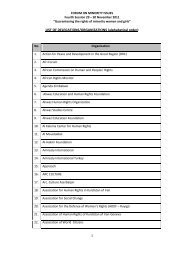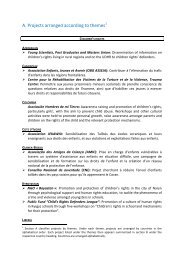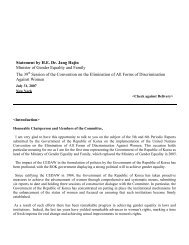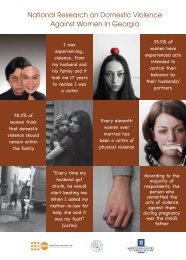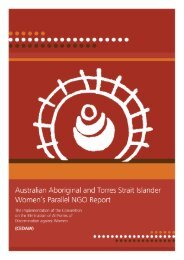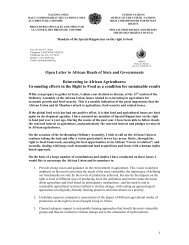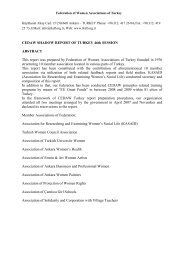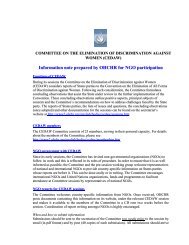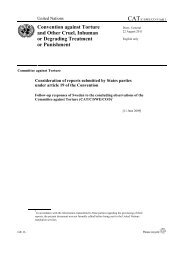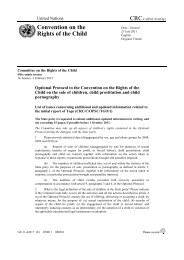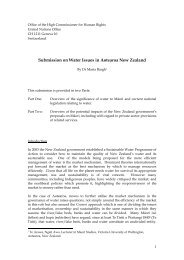Report - Office of the High Commissioner on Human Rights
Report - Office of the High Commissioner on Human Rights
Report - Office of the High Commissioner on Human Rights
- No tags were found...
You also want an ePaper? Increase the reach of your titles
YUMPU automatically turns print PDFs into web optimized ePapers that Google loves.
“Aloha from my fa<str<strong>on</strong>g>the</str<strong>on</strong>g>r <strong>on</strong> my matrilineal side and from my mo<str<strong>on</strong>g>the</str<strong>on</strong>g>r <strong>on</strong> my patrilineal side.<br />
As a Solom<strong>on</strong> Islander I have rights to access land but not to own land. This is because<br />
my fa<str<strong>on</strong>g>the</str<strong>on</strong>g>r is <str<strong>on</strong>g>the</str<strong>on</strong>g> wr<strong>on</strong>g sex for a matrilineal system and my mo<str<strong>on</strong>g>the</str<strong>on</strong>g>r is <str<strong>on</strong>g>the</str<strong>on</strong>g> wr<strong>on</strong>g sex<br />
for a patrilineal system, for me to inherit outright ownership to land. As a result <str<strong>on</strong>g>of</str<strong>on</strong>g> this<br />
situati<strong>on</strong>, in additi<strong>on</strong> to myself, my bro<str<strong>on</strong>g>the</str<strong>on</strong>g>rs and <str<strong>on</strong>g>the</str<strong>on</strong>g>ir wives are also vulnerable. My siblings<br />
and I all have sec<strong>on</strong>dary rights, through our relatives. But my bro<str<strong>on</strong>g>the</str<strong>on</strong>g>r’s wife can <strong>on</strong>ly<br />
access her rights through our sec<strong>on</strong>dary rights, and this c<strong>on</strong>necti<strong>on</strong> will be even fur<str<strong>on</strong>g>the</str<strong>on</strong>g>r<br />
removed for her children.<br />
The <strong>on</strong>ly opti<strong>on</strong> for me to obtain ownership rights to land was for me to marry back into<br />
a patrilineal system, and for my bro<str<strong>on</strong>g>the</str<strong>on</strong>g>r to marry back into a matrilineal system. But<br />
we are human and we didn’t follow culture and got married into <str<strong>on</strong>g>the</str<strong>on</strong>g> wr<strong>on</strong>g systems.<br />
Even though I am an indigenous Solom<strong>on</strong> Islander, I am a settler in my own country.<br />
I have had to grow up with people fighting over land all my life and I am sick and tired<br />
<str<strong>on</strong>g>of</str<strong>on</strong>g> people fighting over land. Having experienced this has made me determined that <str<strong>on</strong>g>the</str<strong>on</strong>g><br />
<strong>on</strong>ly way for my future is to get a good educati<strong>on</strong>, get some land and build my house.”<br />
(Solom<strong>on</strong> Islands)<br />
Since land tenure systems are entrenched in customary practices, which are also reflected in legislati<strong>on</strong><br />
and policies, <str<strong>on</strong>g>the</str<strong>on</strong>g> issue <str<strong>on</strong>g>of</str<strong>on</strong>g> land rights is very sensitive in <str<strong>on</strong>g>the</str<strong>on</strong>g> Pacific. People in <str<strong>on</strong>g>the</str<strong>on</strong>g> Pacific have close<br />
spiritual ties with land; land is revered as mo<str<strong>on</strong>g>the</str<strong>on</strong>g>r; and land is <str<strong>on</strong>g>the</str<strong>on</strong>g> principal source <str<strong>on</strong>g>of</str<strong>on</strong>g> livelihood. It<br />
might take a l<strong>on</strong>g time for people to accept and use <str<strong>on</strong>g>the</str<strong>on</strong>g> human rights framework to remove gender<br />
discriminati<strong>on</strong> from traditi<strong>on</strong>al land rights systems.<br />
“In Vanuatu, when a woman marries, she goes to her husband’s place. Any orders for<br />
land or housing against <str<strong>on</strong>g>the</str<strong>on</strong>g> husband (even in situati<strong>on</strong>s <str<strong>on</strong>g>of</str<strong>on</strong>g> domestic violence) are met<br />
with very aggressive behaviour because it is his land and she is living <strong>on</strong> his land, and<br />
<str<strong>on</strong>g>the</str<strong>on</strong>g>re is no shared ownership.” (Merilyn Tahi, Vanuatu)<br />
“In Kiribati, <str<strong>on</strong>g>the</str<strong>on</strong>g> origin <str<strong>on</strong>g>of</str<strong>on</strong>g> <str<strong>on</strong>g>the</str<strong>on</strong>g> land tenure system, is based <strong>on</strong> a system where land was<br />
acquired by means <str<strong>on</strong>g>of</str<strong>on</strong>g> war, and those who fought bravely got bigger proporti<strong>on</strong>s. This<br />
historical legacy forms <str<strong>on</strong>g>the</str<strong>on</strong>g> ideological reference for male land tenure and still informs<br />
land distributi<strong>on</strong> today, and is <str<strong>on</strong>g>the</str<strong>on</strong>g> source <str<strong>on</strong>g>of</str<strong>on</strong>g> discriminati<strong>on</strong> against women.” (John Collins,<br />
Kiribati)<br />
C<strong>on</strong>flict between custom and laws<br />
Over <str<strong>on</strong>g>the</str<strong>on</strong>g> years different land laws have been introduced. This has created some c<strong>on</strong>fusi<strong>on</strong> between<br />
customary law and formal law, and between c<strong>on</strong>stituti<strong>on</strong>al laws that recognise customary law and<br />
land laws to be applied without discriminati<strong>on</strong>.<br />
At <str<strong>on</strong>g>the</str<strong>on</strong>g> local level, customary law is given precedence over formal law. For example, in <str<strong>on</strong>g>the</str<strong>on</strong>g> Solom<strong>on</strong><br />
Islands, judges <str<strong>on</strong>g>of</str<strong>on</strong>g> <str<strong>on</strong>g>the</str<strong>on</strong>g> local court are usually local chiefs and <str<strong>on</strong>g>the</str<strong>on</strong>g>y decide <strong>on</strong> cases related to land and<br />
housing. They are, however, <strong>on</strong>ly experts in custom and are not legally trained; thus <str<strong>on</strong>g>the</str<strong>on</strong>g>y tend to decide<br />
land matters according to custom. A chief’s authority is extensive; even in electi<strong>on</strong>s, <str<strong>on</strong>g>the</str<strong>on</strong>g> candidate<br />
supported by <str<strong>on</strong>g>the</str<strong>on</strong>g> Chief generally wins. A related problem is that <str<strong>on</strong>g>the</str<strong>on</strong>g> decisi<strong>on</strong>-makers in customary<br />
forums are also <str<strong>on</strong>g>of</str<strong>on</strong>g>ten <str<strong>on</strong>g>the</str<strong>on</strong>g> landowners whose interests are affected.<br />
40 WOMEN’S RIGHTS TO ADEQUATE HOUSEING AND LAND



